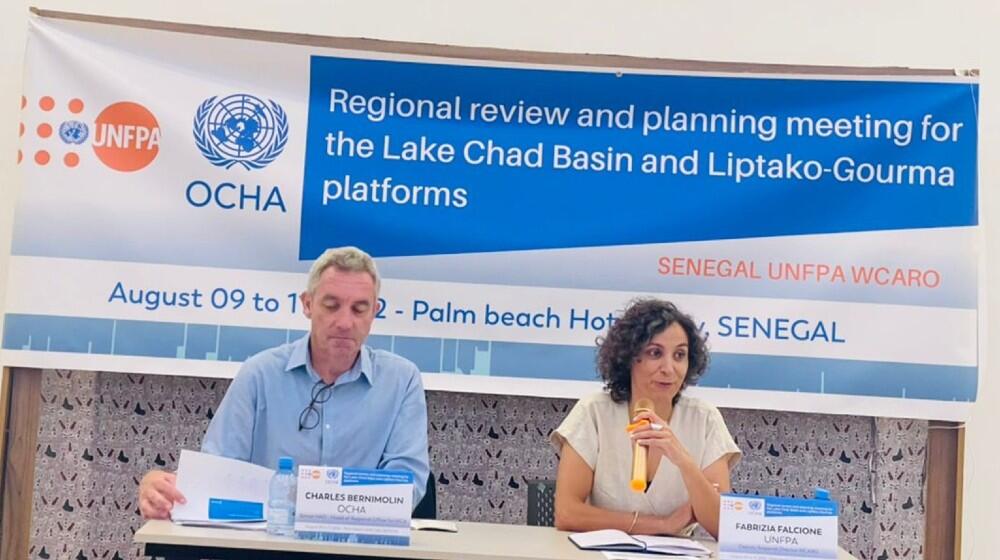The United Nations Population Fund (UNFPA) West and Central Africa Regional Office has renewed its commitment to support and strengthen humanitarian interventions in the region through cross border joint initiatives, including the Lake Chad Basin and Liptako-Gourma platforms. This is one of the key outcomes of a regional review and planning workshop for its regional initiatives. Focusing on the Lake Chad Basin and Liptako-Gourma Platforms, and the design of the Humanitarian Preparedness and Response Plan for countries experiencing the spill-over effects of crises in the Sahel, the workshop took place in Saly-Mbour, Senegal from 9 to 11 August 2022.
Participants included Humanitarian Coordinators and Focal Points from the Lake Chad Basin area (Cameroon, Chad, Niger and Nigeria), the Liptako-Gourma region (Burkina Faso, Mali and Niger) as well as those affected by crises across the region. They are Benin, Guinea, Togo and the Central Africa Republic which is engulfed in a protracted crisis affecting millions of individuals. Just like the crisis in the Lake Chad Basin, the one affecting the Central Africa Republic has not benefitted from enough attention from the media and the international community despite the severe effects on large proportions of the population.
For both the Lake Chad and Liptako-Gourma Platforms, key points identified as priority actions to inform senior management decision-making include the setting up and operationalization of steering committees, and the securing of funding for the implementation of programmatic activities geared towards strengthening the resilience of communities and harnessing the demographic dividend for sustainable development.
Speaking at the close of the workshop, the Regional Director for UNFPA WCARO, Mrs. Argentina Matavel Piccin reiterated the commitment that UNFPA will leave no stone unturned to reach out to the most vulnerable in the last mile, underlining the fact that cross border initiatives undertaken by the Agency are in line with the UN and AU strategies for sustainable development across the Sahel.
Earlier at the opening, the Deputy Regional Director, Mrs. Fabrizia Falcione tasked participants to be UNFPA front liners and soldiers in the battle to save lives.
Speaking also at the opening of the workshop was the Regional Director of the Office for the Coordination of Humanitarian Affairs in West and Central Africa (OCHA). Presenting the overall humanitarian situation in the region, Mr. Charles Bernimolin described it as a volatile and complex environment where millions of individuals, including women and girls would die, if not given the necessary attention and assistance. He pledged his Agency’s support to UNFPA whose mandate he emphasized is “indeed live saving”.
The workshop also served as a framework to provide a baseline for UNFPA Regional Humanitarian Strategy as a strategic and programmatic response framework to address the complex and multifaceted crisis faced by countries in West and Central Africa.
As a reminder, the United Nations Population Fund (UNFPA) in West and Central Africa has set up two regional cross-border coordination platforms (The Lake Chad Basin and the Liptako Gourma) to tackle, at structural level, the complex and protracted humanitarian crisis with cross-border humanitarian impact. With over 12 years of conflict and nearly 10.6 million people in need of assistance, the people of the Lake Chad Basin have been engulfed in a violent conflict trap between state security forces and armed insurgence groups with no end in sight. The crisis currently affecting the area results from a complex combination of factors, including conflicts with non-state armed groups, extreme poverty, underdevelopment, and a changing climate, which together have triggered significant displacement of populations. As of 30 April 2022, Cameroon, Chad, Niger, and Nigeria were hosting an estimated 5,501,412 affected individuals made up of Internally Displaced Persons (IDPs), and Refugees.
As for the Liptako-Gourma region which straddles Burkina, Mali, and Niger, it is also the epicenter of a complex cross-border humanitarian crisis. The violence is exacerbated by non-state armed groups, community tensions, insecurity, the effects of high population growth, high levels of poverty, disaffection, and a lack of livelihood opportunities. Between February 2021 and February 2022, nearly 2000 civilians were killed in Burkina Faso, Mali, and Niger.


